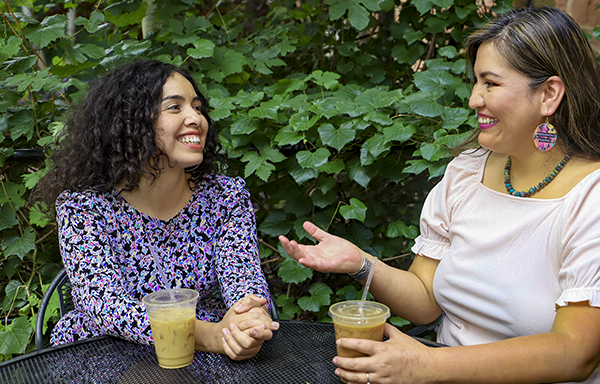Carmenlita Chief and Alexandra Samarron Longorio have devoted their careers to ensuring that every person, especially the most underrepresented and underserved, has a fair and just opportunity to be as healthy as possible.
It was this commitment to health equity that sparked the senior research coordinators at the Southwest Health Equity Research Collaborative’s Community Engagement Core to create their recently released Fairness First Campaign.
Through four different formats—podcast, blog, artistic mixers and expert “X” learning talks—they hope to attract a variety of audiences to support inclusive, meaningful conversations in communities throughout Arizona about health equity, fairness, and justice.
“As members of communities that carry the burden of health inequities here in the Southwest, Alexandra and I know firsthand that health equity and justice cannot be achieved without the meaningful inclusion of diverse community perspectives on health,” Chief said. “Communities require unobstructed access to health research opportunities, as well as the knowledge gleaned from research, in a manner that is relevant to them. This is why we designed the Fairness First Campaign to be a welcoming platform where community members across the Southwest and researchers can connect and comfortably exchange ideas to inform our collective journey towards health equity for all.”
Fairness FirstX Talks: Bimonthly presentations by health equity researchers
Fairness FirstX (FFX) Talks provide SHERC health equity researchers and affiliates an opportunity to share their work with the broader community in an approachable way. Through these live, one-hour online events, researchers explain their research focus in a way that community partners and leaders can understand and connect with. These talks are modeled after the popular TEDx Talk events that happen around the world.
“Health Equity research is about recognizing the lived experiences of communities that experience social injustice as experiential knowledge with the strength to inform research design and implementation,” Samarron said. “Without that knowledge, participation and leadership of communities, there is no pathway to health equity. For this reason, the Fairness First Campaign is a space where health equity can be grounded in a message that includes and highlights diverse understandings of what well-being and health justice is and how communities can thrive.”
“We recognize that communities impacted by inequity are innovative and resourceful in addressing issues related to health inequity such as institutional racism, housing inaccessibility, economic precarity, limited transportation – we want to broaden the knowledge and strategies with which we address unfairness in our communities beyond an academic focus,” she added.
Upcoming event
The inaugural Fairness Firstx Talk, “Who is the expert? Possibilities for Community Action Research Among the Incarcerated” is Oct. 22 at noon and features Emily Schneider, assistant professor of the NAU Department of Criminology and Criminal Justice. Schneider will discuss research methods considerations involved in conducting community action research when working with incarcerated populations. Register for this Zoom event.
Health Justice Futures: Bi-monthly, evening art and literature mixers
According to Chief and Samarron, the goal for this event series is to elevate community-grounded conversations about issues that influence health justice and fairness for communities in the Southwest through the powerful and expressive vehicle of the arts.
Their first Health Justice Futures event on Sept. 29, “Visual Art and Indigenous Health,” featured Diné artists Liva’ndrea Knoki and Garrett Etsitty. With about 50 people in the virtual audience, the artists and hosts discussed the necessity of art in the mobilization of Indigenous communities for health justice, the power of visibility, and what health justice means in the context of Indigenous sovereignty, settler colonialism, and community-engaged research. You can watch their event on YouTube.
Fairness First Podcast
Fairness First podcasts tackle meaningful topics on health equity at a more advanced level, but everyone can learn from their engaging topics, such as “What is Health Equity, Anyway?” “What are Community-Campus Partnerships?” “A Shared Vision for Health Equity” and “Health Equity Voices,” in which Samarron interviews Registered Nurse Cristian Erick Tapia on his experiences with COVID-19 in a local hospital.
“Our goal for these podcast episodes is to invite community voices into our explorations of health equity issues in the Southwest and to really illuminate the movement toward health equity as one that involves multiple sectors of our community, such as education, transportation, food systems, housing, and justice systems, to name a few,” Chief said.
Fairness First blog: Researchers’ voices in health equity
The Fairness First blog represents a space where SHERC researchers can showcase their health equity work by discussing why health equity research matters to them, how they connect to health equity, and what value community engagement has in their research process.
The first blog post, authored by Catrin Edgeley, assistant professor of Natural Resources in the NAU School of Forestry, addresses “How do Wildfires Affect Health Equity?” Edgeley discusses the social impacts of wildfires and how smoke can be an environmental justice issue.
“We hope this campaign will help community members, leaders and researchers to focus on creative and grounded ways to address social, systemic and institutional inequities within our communities and recognize the historical conditions of violence and neglect in which communities have had to survive,” Samarron said. “All this [is done] with the intention to visualize what would it mean and take for communities to reach optimal well-being and health in our region.”
The Fairness First campaign is part of the Southwest Health Equity Research Collaborative and works to promote health equity for all in the Southwest (Funded by NIH 1U54MD012388).
